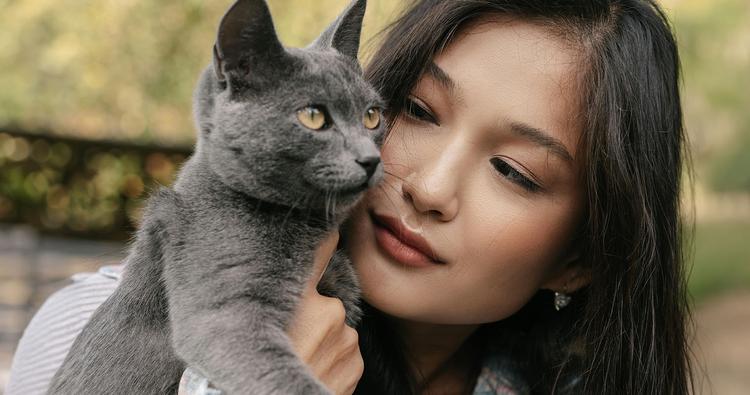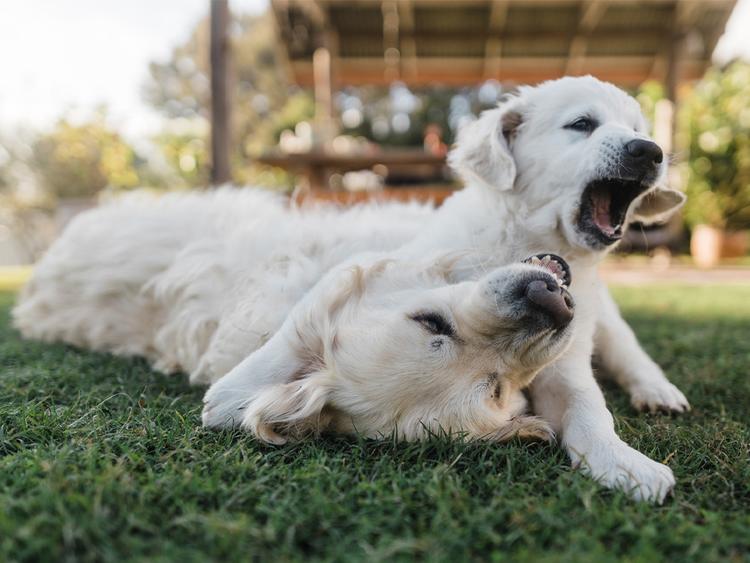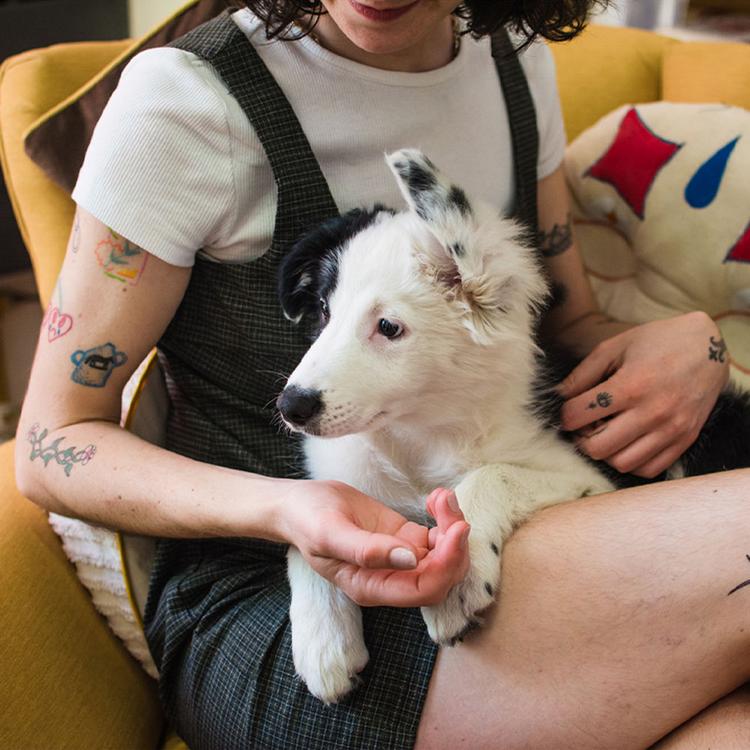Adopting Older Vs. Younger Pets: How to Decide What’s Right for You
Not sure if you should adopt a younger or older pet? Here’s a guide to help you make the best decision.
Not sure if you should adopt a younger or older pet? Here’s a guide to help you make the best decision.
by Tim Barribeau, | April 19, 2024

Melanie DeFazio / Stocksy
When adopting a new cat or dog, one of the crucial decisions you’ll face is whether to adopt a younger or older animal. One isn’t better than the other — they just have different needs and temperaments that may make for a better choice.
So, how do you decide which age of pet is the right fit? Let’s start by running through an overview of the potential pros and cons. Then, we’ll bring it all together to help you decide.
Adopting an adult cat versus a kitten requires you to weigh important factors while making your decision.
We’ll begin with the potential advantages of adopting an adult cat:
Most adult cats are already litter-box trained.
Adult cats typically require less supervision.
Adult cats have developed personalities.
Adult cats usually have a more relaxed demeanor.
Adult cats typically have less upfront costs.
Adult cats usually have a known health status.
You’re providing a home to a cat who may have more difficulty being adopted.
Now, let’s consider the potential drawbacks:
Adult cats may come with underlying health issues or be more likely to develop them soon.
You have less influence in shaping their behaviors.
You’ll likely have fewer years together.
Adult cats may need a longer adjustment period.
Adult cats may have behavioral issues that can be difficult to change.
Next, let’s explore the potential benefits of adopting a kitten:
You can better shape their behaviors and habits.
Kittens have playful energy that can be entertaining and endearing.
Kittens typically have greater adaptability.
It can be rewarding to watch them grow up.
You’ll likely have more years together.
You’ll likely get better insurance coverage.
And now, the potential cons:
You might need to litter-box train them.
Kittens demand more of your time and attention.
Kittens are more likely to engage in destructive behaviors.
It can be challenging to predict a kitten’s long-term temperament.
High energy levels can be disruptive (ahem, nighttime zoomies).
Kittens may cost more initially.
Adopting a puppy versus an adult dog results in two very different experiences. Here’s a breakdown of factors to consider when choosing which age pup is right for you.
Let’s start with the potential pros of adopting an older dog:
Adult dogs have developed personalities.
Adult dogs are typically more relaxed.
Most adult dogs are already house-trained and have basic obedience skills.
Adult dogs don’t need as much supervision.
Adult dogs are more likely to be familiar with human routines.
Adult dogs typically require less money upfront.
You’re giving a home to a dog that might have a harder time getting adopted.
Now, let’s consider the potential drawbacks:
Adult dogs are more likely to have (or quickly develop) age-related health issues.
Adult dogs, especially rescues, may require a longer adjustment period.
Adult dogs may have behavioral issues that can be difficult to change.
You’ll likely have fewer years together.
For puppies, here are the potential pros:
You have a clean slate for training and shaping their behaviors.
Puppies are quick learners and more open to new things.
You’ll likely have more years of companionship ahead.
You’ll have better insurance coverage.
Witnessing a puppy grow into an adult dog can be rewarding.
Lastly, the potential cons of bringing home a puppy include:
You will likely need to train the puppy.
There’s an increased risk of destructive behavior (hide your shoes!).
Puppies require a large time commitment.
There’s an increased risk of indoor accidents.
You don’t know how the puppy’s personality will develop as they age.
High energy levels can be disruptive and difficult to manage.
Puppies may cost more, initially.
Now that you have an overview of the pros and cons of younger versus older pets, let’s put it all together and determine which option is best for you.
Consider adopting a puppy or kitten if…
The biggest, most intense part of adopting a young animal is that you have to be involved in their training. For dogs, that means house-training, basic commands (sit, stay, leave it, etc.), leash-training, and socialization with other people and animals.
Similarly, kittenhood is the best time to teach cats which areas are acceptable to scratch, how to play appropriately, how to use their litter box, and how to accept being handled by humans.
Young animals (especially puppies) will have indoor accidents. Even if you’re well on your way to a house-trained or litter-trained animal, sometimes a kitten or puppy just can’t make it in time, to where they need to do their business. If you get a youngster, be prepared to clean up lots of messes.
Very young animals require almost constant care and monitoring. This partially includes managing their immediate needs — such as taking puppies out every half hour to three hours to potty — but it also involves socialization, training, and enrichment. The more time you spend interacting with your young pet, the more confident and socialized they’ll be as an adult dog. Plus, a tired and well-entertained animal is less destructive than a bored one.
Having pet insurance can mean the difference between spending tens of thousands on an important procedure or just a couple of hundred on a deductible. Here’s the thing, though: Insurance will not cover pre-existing conditions, or ailments that were present before your pet’s insurance policy was initiated. Enrolling your pet in insurance when they’re young reduces the risk of coverage denials due to pre-existing conditions, a common occurrence among adult animals.
Teething means chewed-up shoes, table legs, pillows, toes, you name it. It doesn’t matter if it’s a cat or a dog — those tiny needle teeth will be gnawing on something, no matter how many chew toys you put in front of them. You can do your best to manage this with bitter spray and training, but also be aware that it’s mostly unavoidable.
Adult animals are often overlooked, but they come with some serious perks.
Adopt an adult animal if…
Most adult animals will come to you with at least some level of training. Dogs will probably be house-trained (and might know some basic commands), and cats will likely be litter-box trained. There will be some outliers in this regard, but chances are you can rely on them to know the basics.
If you want an animal with a certain type of behavior, go with an older one who is already demonstrating that behavior. You can encourage certain behaviors and train young animals, but temperament-wise, there’s a lot you’re not in control of.
Regardless of age, animals adopted from shelters typically come microchipped, spayed or neutered, and vaccinated. However, if you adopt from a private party, younger animals may not have undergone these procedures, so you might have to cover these costs. Also, to help adult animals find loving homes, many adoption agencies lower or waive the adoption fees for older animals.
Many people are drawn to the adorable appearances of puppies and kittens, often overlooking adult (and especially senior) pets. Sadly, older animals frequently have longer stays in shelters, or in very unfortunate circumstances, face euthanasia due to overcrowding.
If you want to help an animal who may otherwise be passed over for adoption, bringing home an adult animal is an excellent option. Plus, people often report experiencing the palpable gratitude of older animals after bringing them home — an added reward to your decision.
Adult animals typically don’t need frequent hands-on care like very young ones do. Adult cats are generally fine left to their own devices during an entire workday, and an adult dog may only need to be let out or walked a couple of times during the day. If you have a schedule you need to stick to, an adult animal may be the best way to go.
Pets tend to mellow out as they age. Where a puppy or a kitten might tear around the house at all hours, an adult pet will probably be happy to just flop in a comfy spot for a few hours. That’s not to say that a grown cat won’t have 3 a.m. zoomies or that your adult dog won’t bark at a squirrel that goes past the window — quieter isn’t the same as quiet.
Before adopting a dog, research breeds that match your lifestyle, consider the time commitment, ensure financial readiness for vet care and supplies, and evaluate space for exercise and living needs. For even more details, be sure to check out our new puppy checklist and guide on bringing home a new puppy.
Proper care of a kitten includes providing balanced nutrition, regular veterinary check-ups, litter-box training, socialization, and plenty of play and mental stimulation. Also, you must provide them with a safe environment free of hazards.
In general, it’s easier to train a puppy than an adult dog. They’re more impressionable and pick up new skills and behaviors quicker. Although older dogs may have established habits, they can also learn new behaviors with patience and positive reinforcement.
Managing Your Kitten’s Rough Play
The Puppy Timeline: Physical and Mental Changes
When the Owner Does Not Know: Comparing Puppies and Adult Dogs’ Showing Behavior

Tim Barribeau is a freelance writer, editor, cat dad, and “help your boyfriend buy a suit that actually fits for once” consultant. He was previously the Style and Pets editor at Wirecutter, and has bylines at a bunch of publications that don't exist anymore (and a couple that still do).

Adoption Advice

Adoption Advice

Adoption Advice

Adoption Advice
Is the responsibility of taking care of your pet causing you to worry about your budget? Rest assured, there are a number of ways to minimize this financial stress.

Adoption Advice
Keep your pet healthy and control overpopulation. Find out why spaying or neutering is a smart choice for your furry friend and the community.

Adoption Advice
Thinking of adopting a dog? Learn more about the average monthly costs of dog parenthood.

Adoption Advice
Learn the many benefits of adopting a cat, and all the ways felines can enhance your life and home.

Adoption Advice
Thinking of adopting a new cat? Learn how to navigate the process and find a cat that is perfect for your lifestyle.

Adoption Advice
Considering cat adoption? Learn more about the pros and cons of adopting kittens.